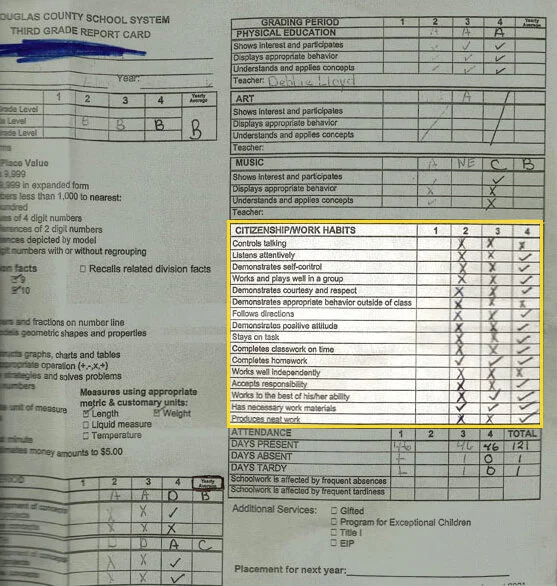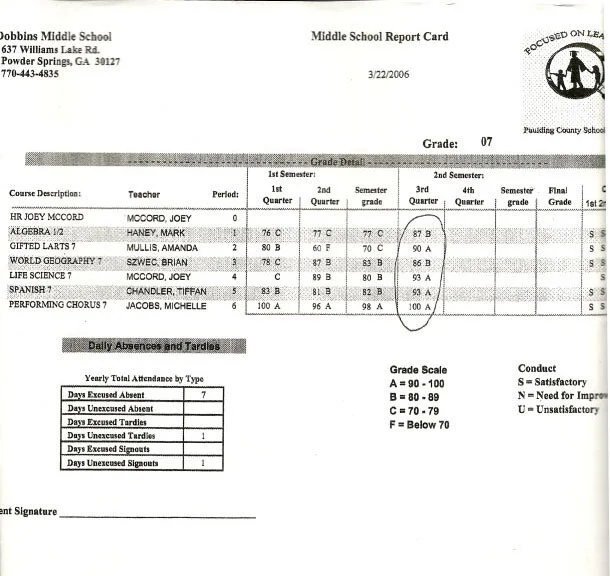
Working With ADHD
individualized treatment
I work with children and their parents, as well as adults, to develop individualized treatment plans, with or without medication, and support systems in order to manage ADHD.
Medication
Deciding whether to place a child on medication for ADHD is not an easy decision. Most parents are understandably reluctant to do so, especially given all the negative press ADHD medications have gotten. Over the years, I began collecting “positive press”- report cards and true accounts from children and parents about the benefits of medication. Not all children benefit from medication (30% do not respond) and there are certainly side effects. However, with proper diagnosis and monitoring, the benefits often far outweigh the drawbacks. Here are some examples from my clients:
Citizenship/Work Habits Before & After Medication
Sixth Grade Report Card Before & After Medication
You can also view a letter from a parent here.
Classroom Follow-Up Form
If you choose to start your child on medication, this form is a helpful tool to determine the optimal dosages. Have your child’s teacher complete the form approximately a week after medication is started (and after any subsequent medication changes) Bring the form with you to the prescribing physician to help guide treatment.
You can download the form here.
Book a complimentary 15-minute phone session here or email kerri@kerrigoldingorransky.com to schedule a consultation.
What does ADHD look like?
Typically those with ADHD show symptoms of hyperactivity, impulsivity and/or inattention. Not all children with ADHD are bouncing off the walls. There are actually three different types of ADHD- the Hyperactive-Impulsive Type, Predominately Inattentive Type, and Combined Type.
Hyperactive ADHD
Hyperactive children always seem to be in motion. A child who is hyperactive may move around touching or playing with whatever is around. During story time or school lessons or church, the child might squirm around, fidget, or get up and move around the room. Some children wiggle their feet or tap their fingers. A teenager or adult who is hyperactive may feel restless and need to stay busy all the time. Those with ADHD often have an internal restlessness- like an itch that you can’t scratch. Fidgeting, doodling, and tapping feet help scratch that itch.
Impulsive ADHD
Impulsive children often blurt out comments without thinking first and have a tendency to interrupt others. They often grab things and can hit or kick if they don’t get their way. They may also fail to consider the consequences of their actions. Such children may find it hard to wait in line or take turns. Impulsive teenagers and adults tend to make choices that have a small immediate payoff rather than working toward larger delayed rewards.
Inattentive ADHD
Inattentive children may quickly get bored with an activity if it’s not something that they really enjoy. Organizing and completing a task or learning something new is difficult for them. As students, they often forget to write down a school assignment or bring a book home. Completing homework can be huge challenge. At any age, an inattentive person may often be easily distracted, make careless mistakes, forget things, have trouble following instructions, or skip from one activity to another without finishing anything. Procrastination is a huge issue for those with ADHD, as is remembering appointments and getting to places on time. Some with ADHD are mainly inattentive. They seldom act hyperactive or impulsive. An inattentive child with ADHD may sit quietly in class and appear to be working but is not really focusing on the assignment. Teachers and parents may easily overlook the problem.
Frequently Asked Questions about ADHD
My child doesn’t seem to have a problem focusing when it’s something he wants to do. It seems like his attention problems are due to “selective attention” so how can this be ADHD?
Those with ADHD typically don’t have any problem focusing on things they enjoy. In fact, at times, they may be hyper-focused on these activities. They appear so focused on the activity that they tune out anything else around them (ie they can watch their favorite movie or play video games for hours and won’t seem to hear if someone calls their name) It is only when something requires sustained mental effort that the ADHD interferes with the ability to stay focused.
I’ve heard Ritalin is not a good medication. Which medication is best?
There is not one medication that is “best” as it depends on an individual’s body chemistry. Just because a medication works well for your neighbor’s son does not mean it will also work for your child. You may have to play with a few different medications and dosages to find the one that works best. However, since ADHD is a genetic disorder, if a family member responds well to a particular medication it may make sense to start with that medication.
Will my child have to be on medication forever?
Not necessarily. Twenty-five percent of children with ADHD outgrow the disorder. Even if your child is in the seventy-five percent who does not outgrow the disorder, they may not need to stay on medication into adulthood.
Does medication help everyone?
About 80% of those with ADHD will improve significantly on medication. However, a smaller number will not respond to medications. For these individuals, it is important to understand the ways ADHD effects their functioning in order to identify appropriate ways to compensate.
What kind of side effects can I expect?
The most common side effect is disturbed appetite. Those on stimulant medications will often not be hungry for lunch It is recommended that you eat a full breakfast before taking the medication. Some children will have a “Boost” shake during lunch if they are not hungry to ensure they are still getting the necessary nutrients. Appetite typically returns when the medication wears off. Other side effects include sleep disturbance, stomach aches and headaches. These side effects generally wear off as the body adjusts to the medication. A less common side effect are tics (involuntary body movements) Tics are not caused by the medications, but if your child has an underlying tic disorder that is latent, the stimulants may unmask it. Finally, there is also something known as a “rebound effect”. This occurs when the medication is wearing off and may result in an exacerbation of symptoms. The symptoms that were present before the medication often appear worse as the medication is wearing off. This often occurs in late afternoon or evening.
I’m concerned that the medication will make my child a zombie. Will it change his personality?
If your child seems like a zombie on the medication, it likely means that it is not the right medication or the right dosage. There are many different types of medication and dosages and it will take some time to determine the right one. Once on the right medication, your child will still be the same kid but will most likely feel more confident and be much more pleasant to be around.
Is medication the only option to treat ADHD?
Medication is not the only intervention for ADHD but it is probably the best intervention. Studies have been done that have compared ADHD children on medication alone, children who had medication and behavioral interventions, and children who had behavioral interventions alone. There was only a marginal difference between those who had medication plus behavioral interventions and those who had medication alone, while those who only had behavioral interventions did not show much progress. Behavioral interventions that can be an alternative or support to medication include regular exercise, dietary changes, regular routines, behavior charts and nuerofeedback.
What about diet? Does sugar increase hyperactivity?
There has been increasing evidence that shows that many children with ADHD symptoms have an allergy or sensitivity to food colorings. These additives include “Red 40” and “Yellow 5 “ It is often helpful to remove foods that contain these dyes from a child’s diet. A more involved diet is the Fiengold diet which eliminates not only artificial coloring but also artificial flavorings, artificial sweeteners and preservatives. It also eliminates foods that contain salicylics which are found in apples and oranges. Families have noted success with this diet, but also report that it is very rigid and difficult to maintain. Click here for more information on the connection between ADHD and food dye.
With all of these side effects, why would I risk putting my child on medication?
Not every child has side effects. If your child does have side effects that you are not comfortable, you can simply go off that medication. The stimulants have a very short half-life, meaning they are in and out of your system the same day (some in just a few hours) You will know immediately if your child will have an adverse reaction and the effects will wear off that same day. Even if your child does have some effects, many parents feel that the benefits from the medication far outweigh the side effects. The biggest side effect of not being on medication is poor self esteem. Children with ADHD often struggle with making or keeping friends, as ADHD typically impacts social skills. These children are more prone to interrupt, grab things, disturb other children and impulsively hit. These children are also more apt to get in trouble due to their impulsive behaviors which also impacts self esteem. Finally, children with ADHD are often quite hard on themselves when they consistently lose things, forget things or make careless mistakes. For these children, it is important to weigh the side effects against the self-esteem issues .


